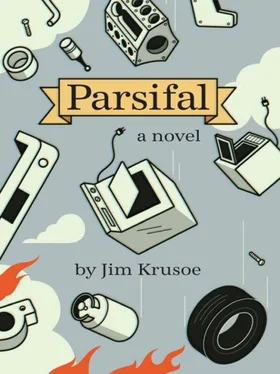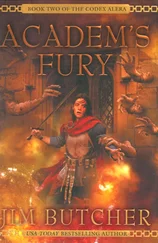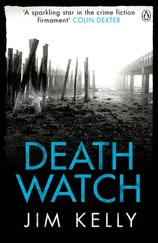Is wanting to possess anything at all that lasts — compared to the greater truth of change embodied in trees and animals — just vanity?
“All is change,” Joe would say.
Then again, he thinks, so what?
It was after the whole Happy Bunny experience, when Walter’s defense — improbable as it seemed — had worked and Parsifal was at his first court-mandated visit, that Joe told Parsifal he didn’t like to judge people.
“I suppose that’s why I became a therapist, Parsifal,” Joe said, “because for me, no matter how much blood you may or may not have on your hands, you’re just another struggling human being. Believe me, I’ve worked with plenty of criminals, and by now nothing would surprise me.”
Not surprisingly, therefore, judgment-wise, Joe’s own appearance ranged from neglected to downright shabby. He favored Hawaiian shirts, half tucked in and half out, and mostly went around unshaved. He was also completely bald, giving him the look of a giant woodchuck. And yet, Parsifal had to admit that Joe tried to be helpful.
“You don’t have to be so hard on yourself, Parsifal,” Joe said during one of Parsifal’s early visits. “Anyone can see that there’s a straight line from your mother perishing in that raging forest fire to you burning down the Happy Bunny by ‘accident.’ Fire — get it? Now think of your own life as a sentence being written by someone not unlike yourself. What you’ve already written: everything from the past — say, from your mom and the forest fire, until this moment — has filled up many pages. And trust me, those blank pages ahead are your future. Remember that they are the ones you have to fill out — and no skipping because of drugs or inattention.”
Parsifal thought about it and frankly was unable to see Joe’s point, though he didn’t want to disappoint the man by saying so. He had never taken drugs, even once. Joe scratched the side of his face near his mouth, where a spot of egg from his breakfast had stuck.
“Say,” Joe added, “I just thought of this now, but you don’t suppose your mom set the fire on purpose, in order to cover up her murder of your dad for his infidelities during his life in the city, do you?”
Parsifal considered. It was possible, of course, but he couldn’t see how Pearl would have gotten by without those sacks of beans and rice Conrad used to carry into the forest for the two of them. He said, “I doubt it.”
“Well, it was just an idea,” Joe said. One of his better qualities as a therapist was that he never seemed overly attached to his theories. “But say,” Joe continued, “here’s another one: Have you ever thought of going into the fountain pen repair business? It won’t make you rich, but it’s a steady income, plus you could work at home.”
Parsifal noticed that the fingers of Joe’s right hand were stained with dark blue ink, the result, he now knew, of an ill-fitting feed. Joe crossed his legs. He appeared to have walked through something unpleasant on his way to the office, and some of whatever it was had stuck to the soles of his huaraches.
“That’s an interesting idea,” Parsifal had told him. “As a matter of fact, I’ve already started.”
Parsifal ate the prune-sesame bar, which was not nearly as bad as it sounded, and it filled him with a surprising amount of energy. He did not know what Misty and her friends had put into those bars, but this one was dynamite. He walked and walked. He searched the ground for any signs of home (a flattened door, a heavy iron skillet). He looked above his head (for maybe a familiar low branch he used to loll on, now raised up by time), but saw nothing he recognized. Was something burning? Had Misty and her friends made a small campfire to toast drugs, or was this smell part of a larger conflagration, possibly hundreds of miles away? He could not tell, except that his nostrils tingled in a way that made him nervous.
Joe had been right; Parsifal did not have a good history with fire.
So his first thought was to flee, until he remembered the advice of the Old Trapper: if a person is uncertain of the source of a fire, the worst thing to do is run, because the person might race straight toward it and by the time the person realized this, he or she (!) would be too tired to outrun it. Observe the birds, the Old Trapper wrote, because the birds are the ones who have the best overall view. See from what direction the birds are flying; watch where they are headed.
Great advice, except for the fact that all the birds had disappeared completely, including the one that had been circling or spiraling overhead, it seemed, forever.
Pearl.
parsifal must have been nine or ten years old when Conrad took him aside one afternoon to explain the intricacies of double-entry accounting. They sat together on an old log, his father in his dark, pin-striped city suit with a tea towel covering the log so he wouldn’t get his pants dirty, and Parsifal in his usual knockabout outfit of shorts, a tee shirt, and, sensing a cold front was on its way, an animal pelt or two that Pearl had stitched together in her spare time.
“To begin with, son,” Conrad said, “in double-entry accounting every transaction is recorded by entries in at least two accounts. The total of the debit values must equal the total of the credit values, and the premise for this is that any monetary transaction must logically affect two aspects of a company.” Parsifal must have looked puzzled, because his father continued, “For example, if an item is purchased — I call it the ‘debit inventory’—then it must also be paid for, and I call this part the ‘credit bank account.’ That’s the first aspect. Are you with me so far?”
Parsifal nodded.
“Alternatively, if an item is sold, something I call the ‘credit inventory,’ then the company must also be paid for it out of the debit bank account, and that’s the second aspect.”
“That seems only fair,” Parsifal told him.
“Yes,” Conrad answered, “it is. But you might also note that while most transactions consist of two entries, some may have as many as three or more entries. For example, a supplier invoice total equals the net value plus the taxes. This system is called ‘double entry’ because all transactions must ‘balance.’That is, at the end of the day when you reach for your jacket to go home — not to your house where you live with your mother here in the forest, you understand, but to a place like the modest pied-à-terre I am forced to maintain in the city all the while I am missing your mother and you — the debit and credit sides must equal the same amount.” Conrad gave his son an encouraging smile.
“Historically, debit entries have been recorded on the left-hand side and credit values on the right-hand side of a general ledger account, but of course once you get the hang of it you are free to express yourself in any way you wish.”
Then Conrad handed Parsifal a large pile of acorns and told him that they were his inventory. “Now,” Conrad said, “even though I just gave you those acorns, I want you to sell some of them back to me at a nickel each so you can make a profit. But at the same time, I want you to know I’m going to be charging you for delivering the acorns to you just now, and also you are going to have to pay me rent for that flat spot on top of this log where you have put them. And by the way, even though I’m going to be paying you for those acorns, every so often I will cheat you, and you won’t be able to stop me. It might very well be that your bookkeeper is embezzling some of your profits; perhaps he or she is a gambler, or has a pet charity, but you won’t know that until the end, when you will be able to make a full accounting by means of the technique I am about to teach you.”
Читать дальше












